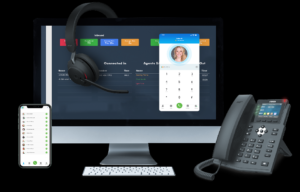How to Choose an Internet Connection for Uninterrupted WFH

A good internet connection is essential for productivity when you’re working from home. A laggy internet with low speeds doesn’t only slow you down, it may also frustrate you and lower your satisfaction.
You need a fast, reliable internet connection that allows you to enjoy speedy browsing, downloading, and streaming around the clock. But what does that mean exactly?
Here, we look at the factors you should look for in an internet connection for WFH. Let’s get started.
1- High Uptime
The one thing you want the most from your internet connection for WFH is reliability. You should be able to browse the internet and connect to your office servicer at any time. However, all internet service providers (ISPs) suffer from disruptions arising from connection errors, cable damages, software problems, etc. How infrequent these accidents are, determines how reliable the ISP is.
Uptime is a measure of the percent of the time the internet is accessible through an ISP in a year. Choose an ISP with the highest uptime you can find. An uptime higher than 99% is considered good.
2- High Download and Upload Speeds
If you work on large files, you should consider both the download and upload speeds of your network. You may think an internet connection with a 300 Mbps top download speed would work for you, but if the upload speed is only 3 Mbps, sending your large files back will take forever.
The best choice, in this case, is fiber internet. ISPs with a dense fiber-optic infrastructure such as CenturyLink allow the same upload speed as their download speed. Speeds with CenturyLink Internet reach up to 940 Mbps. You can upload or download files at the same rate.
3- Low Latency
If you work in real-time auctions, online betting, real-time data management, or any other real-time application, you need an internet connection with low latency. Latency is the time it takes for a data package to transfer between your computer and the server you’re working with. Latency depends on various factors such as whether you’re connected via Ethernet, the distance between you and the server, and the type of internet connection you have.
Information travels at a constant rate. So the latency between you and your work server is at least the time it takes for electronic signals to travel distance to and from the server. You can improve this speed by choosing a fiber internet connection. Fiber connections use fiber-optic cables to transfer information using infrared light. Light travels faster than anything else, so fiber internet can give you the lowest latency possible.
4- No Overage Fees
Some ISPs set limits to how much data you can use in the month and charge overage fees if you exceed the data cap. Most ISPs today have abandoned this model, but some still offer deals with data caps. Such a connection will only stress you out every time you download or upload a large file. Do yourself a favor and pass on any internet connections with data caps.
5- Free From Contract
Some ISPs also try to lure you in with low rates if you sign a long-term contract to stay with the company for a year or so. These internet services often have high downtown rates which makes them unreliable. Such ISPs also throttle their users’ bandwidth extensively to compensate for their limited bandwidth. You won’t get nearly the speed advertised.
Choose ISPs confident enough in their service that they never ask you to sign a contract. You should have the peace of mind to be able to change your ISP if you want.
6- The ISP’s Network Bandwidth
ISPs can only handle a certain amount of data. In peak times when a lot of people are using the internet, the ISP may experience network congestion. This can limit some users from accessing the internet altogether. ISPs combat this by artificially limiting the bandwidth for everyone. More users can access the internet this way but at lower speeds.
It’s hard to determine what’s the bandwidth of an ISP’s infrastructure. But as a rule of thumb, ISPs offering fiber internet have a much higher bandwidth than those offering cable internet. Fiber-optic cables have a much higher bandwidth than coaxial cables, so your ISP may never have to throttle your bandwidth.
7- Choose Fiber Internet If Possible
Fiber-optic internet is ideal for working from home in every way. Fiber internet uses infrared light, allowing for the lowest latency possible. Fiber internet connections also have high download speeds and often upload speeds as high as download speeds. And lastly, as we just discussed, fiber-optic cables have much greater bandwidth than coaxial cables. You expect high speeds even at peak times.
The Bottom-Line
CenturyLink Internet has everything you’d want in an internet connection for WFH. CenturyLink Fiber Internet allows top speeds of up to 940 Mbps with 99.9% uptime. The connection is also contract-free with no data caps. Visit buytvinternetphone.com to check for CenturyLink Internet availability in your area.







